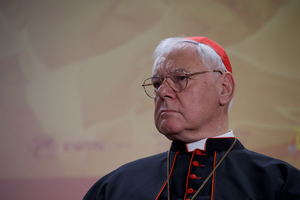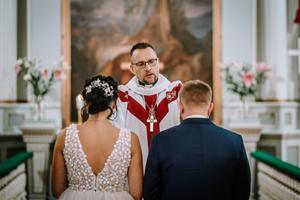Pope Francis and European Populism: Is More Dialogue Needed?
In the wake of the right-wing La Lega party’s triumph in Italy’s European parliamentary elections, many observers insist the Church hierarchy needs to be less hostile to such political perspectives.

ROME — Last month’s European parliamentary election results in Italy, in which the right-wing La Lega party won on a campaign partly based on anti-unlimited immigration rhetoric, came in the face of unprecedented opposition from the Vatican and many of Italy’s bishops.
Matteo Salvini, Italy’s vice premier, who heads the La Lega party in the country’s ruling coalition, jubilantly kissed a rosary cross after winning a resounding 34% of the vote May 26, cementing La Lega’s position as Italy’s largest party.
It won on a so-called “populist” or “sovereigntist” platform of opposition to unlimited immigration, as well as reversing Italy’s shrinking population through stable employment, the right to health care and more childbirths.
But it was La Lega’s anti-immigration rhetoric that initially provoked the ire of the president of Italy’s bishops’ conference, Cardinal Gualtiero Bassetti, and papal adviser Jesuit Father Antonio Spadaro, the director of the Jesuit monthly journal La Civilta Cattolica.
Both said Salvini was not a Christian because of his position on immigration (although Cardinal Bassetti later insisted he never said don’t vote for Salvini). The papal almoner, Cardinal Konrad Krajewski, also opposed the policy position, saying in the run-up to the election that the Vatican would never give Salvini an official papal blessing.
Further opposition from the hierarchy came shortly before the election when Salvini held up a rosary, kissed a crucifix and, in an unprecedented act for an Italian political leader, commended the country to the Immaculate Heart of Mary. Critics, who included Cardinal Angelo Bagnasco, the former head of the Italian bishops’ conference, said it was misappropriating the faith for political ends.
But the sum of these criticisms, along with Pope Francis’ apparent refusal to receive Salvini while having in the past met communist dictators and praised notorious radical Italian pro-abortionists such as Emma Bonino, is widely seen as causing public disaffection with this pontificate and sympathy for La Lega.
“Clearly coming out against Salvini was a big mistake,” Rome citizen Claudia Castellani told the Register May 29, adding that it led to much criticism of the Pope on social media. “Three or four years ago, people were more delicate in their criticisms,” she said, “but now they won’t even be respectful to the figure of the Pope.”
Father Spadaro, who many see as an unofficial spokesman for the Pope, most of Italy’s bishops and the Vatican carried out an “unprecedented” and “very harsh electoral campaign” against Salvini, according to Riccardo Cascioli, editor of the Italian Catholic daily La Nuova Bussola Quotidiana, one that caused “widespread annoyance and considerable discomfort about a Church being reduced to a ‘political party.’”
He told the Register June 2 that such a politicization shows a forgetfulness of the Church’s social doctrine and that “the majority of practicing Catholics voting precisely for Salvini” sent a “clear signal.”
Calls for Dialogue
It would be better if those close to Francis, and the Holy Father himself, talked to Salvini, rather than “meddle in politics,” Cardinal Gerhard Müller, prefect emeritus of the Congregation for the Doctrine of the Faith, told Corriere della Sera May 28. His comments were later echoed by the Vatican secretary of state, Cardinal Pietro Parolin, who said the Church “must also dialogue with Salvini” but that religious symbols should not be abused.
Such reactions at the Vatican showed a certain “embarrassment” as well as a “mismatch” between what the Pope and most Italian bishops think and the beliefs of the Italian public, said Corriere della Sera’s senior correspondent, Massimo Franco. “The problem is not about the politics of Salvini. The problem is this refusal to meet him,” Franco told the Register June 3. “It eventually helps him.”
The Pope told reporters June 2 he had never received a request from Salvini for an audience, but stopped short of saying whether he would grant one if such a request were made.
Most Italian Catholics “don’t share in this refusal” of an audience, Franco said. “Of course we understand why the Pope says such things [about populism], but the impression is that the effect is close to zero.” There is a “disconnect” with public opinion, he said, adding that the election result “might be considered a defeat for Spadaro.”
“That doesn’t mean the Pope is wrong to underline xenophobia, but the problem is how to deal with it politically and theologically,” Franco said. “People don’t understand this approach and don’t share this approach.”
Steve Bannon’s Perspective
Steve Bannon, President Donald Trump’s former strategic adviser whose sovereigntist movement helped pave the way for La Lega in Italy, believes the Pope must dialogue with Italy’s vice premier or the situation will “pick up momentum and is going to get worse.”
He told the Register June 4 he has been concerned about Francis’ involvement in elections ever since the Pope criticized Trump’s wall policy on the Mexican-U.S. border during the presidential election campaign in 2016. “He has never really been called out for that,” Bannon said, adding that failure to stand up against it has “just led to this continuation.”
Bannon, who said he comes from “working-class, Irish-Catholic Kennedy Democrats,” said what he finds “most disturbing” is that the Pope is “essentially siding with the global elites, not the poor.”
The poor, he added, are from the Global South who are being forced to head north because of “horrific, biblical, tragic situations” and poor economic conditions, but the burden is “falling upon, or has fallen upon, working-class people” in southern Europe or in the southern United States.
By “continually” pushing for open borders and unlimited immigration, what the Pope is advocating, therefore, “is not a solution,” Bannon warned, but is “essentially driving what would be a situation of anarchy.”
French intellectual Alexandre Del Valle, author of Il Complesso Occidentale, a new book on the failure of European multiculturalism, welcomed Cardinal Parolin’s call for dialogue with La Lega, but was surprised such an overture seems “so difficult for the Church.” Recalling that the post-conciliar Church “usually advocates dialogue with everyone,” he wondered: “Why is it so difficult for the Pope and part of the Church to dialogue with their own faithful who defend Christian identity and civilization, while it appears so easy with people who are openly the enemies of the Western world?”
Bannon believes it is this particular lack of dialogue that has led to polarization and that engagement will help resolve it. “Dialogue with the traditionalists and dialogue with the sovereigntists and, by the way, the people with the Greens and everyone else — that’s the way we hold the Church together,” Bannon said.
“If the Pope believes in dialogue,” he added, “there should be dialogue.”
Edward Pentin is the Register’s Rome correspondent.
Europe correspondent Solène Tadié contributed to this report.
- Keywords:
- edward pentin
- europe
- pope francis
- populism
- solène tadié
- vatican

















